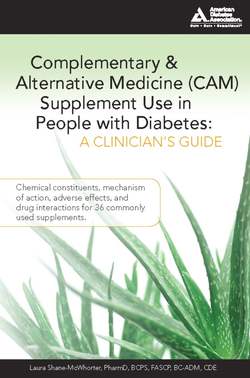Читать книгу Complementary and Alternative Medicine (CAM) Supplement Use in People with Diabetes: A Clinician's Guide - Laura Shane-McWhorter - Страница 9
На сайте Литреса книга снята с продажи.
REGULATION OF CAM SUPPLEMENTS
ОглавлениеDietary supplements do not need FDA approval before being marketed.4 Prior to 1994, CAM supplements were classified as foods or drugs, depending on the intended use. In 1994, Congress passed the Dietary Supplement Health and Education Act (DSHEA), which created a separate category for botanicals and other products.47 Now they are classified as dietary supplements.47 This legislation allows dietary supplements to forego the same stringent approval process that is required for drugs, and therefore proof of safety and efficacy is not required for marketing.
The reclassification has resulted in a serious consequence. Sometimes contaminants or substitutes have been found in the products. For instance, as noted above, some diabetes products have been contaminated with lead,29,30 and other products touted as being “herbal” have been found to contain prescription drugs such as chlorpropamide or glyburide.28,48
A possible solution would be the use of standardized products. Standardization guarantees that each dose provides a consistent level of the active ingredient. However, proponents of biological complementary therapies argue that standardized extracts may not always contain all of the therapeutic ingredients found in the natural product. A pertinent factor is whether the standardized preparation actually reflects the labeled information.22
DSHEA allows manufacturers of dietary supplements to make claims regarding the ability to maintain “structure and function” of the body, but does not allow claims regarding diagnosis, treatment, cure, or prevention of disease.47 If a manufacturer claims the product affects body structure or function, the label must include the following statement: “This statement has not been evaluated by the Food and Drug Administration (FDA). This product is not intended to diagnose, treat, cure, or prevent any disease.” The manufacturer must also notify the FDA within 30 days after a product is on the market if it bears such a label.
FDA has implemented regulations that ban implied as well as expressed disease claims.47 For example, claims made by a manufacturer that a patient could misconstrue as indicating treatment or prevention of a disease are no longer allowed. In the new regulations, a product may make health maintenance claims but not disease claims (“maintains a healthy prostate” is allowed, but “treats benign prostatic hyperplasia” is not).
FDA has published a Dietary Supplement Strategy (Ten Year Plan).49 The year 2010 is the target year when FDA will have a “science-based regulatory program that fully implements DSHEA, in an effort to provide consumers with a high level of confidence in the safety, composition, and labeling dietary supplement products.” This program will assist clinicians in providing better information to people with diabetes who use CAM supplements.
